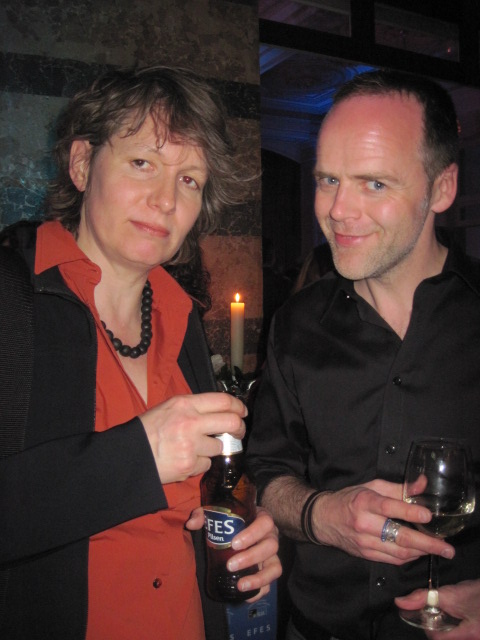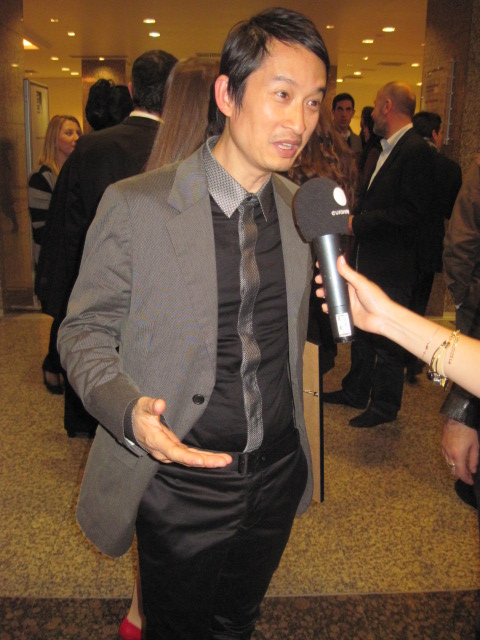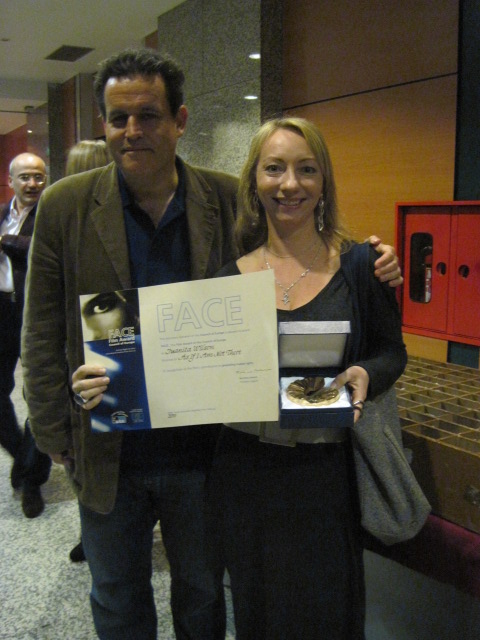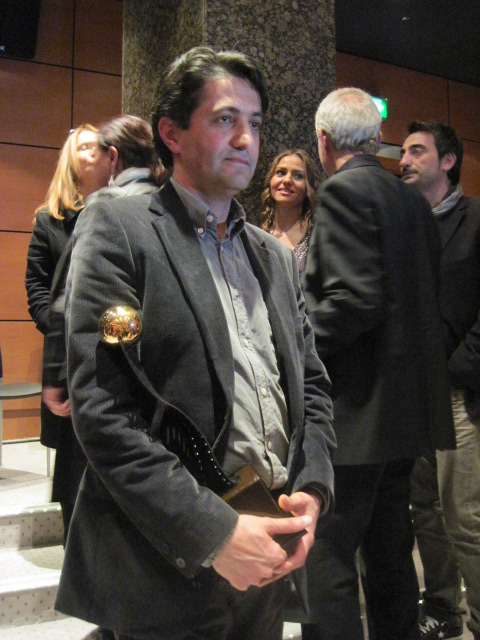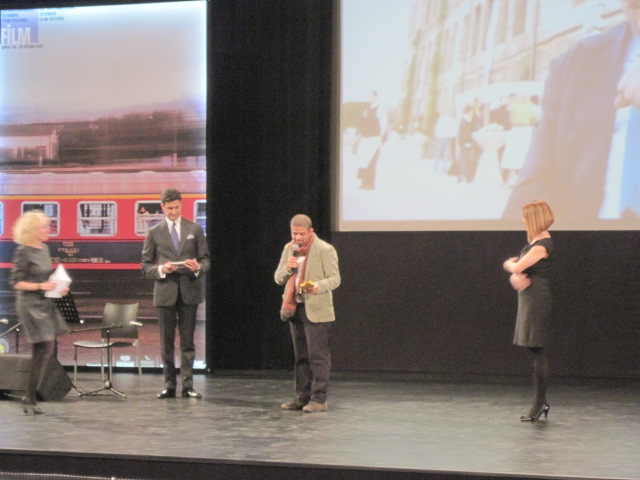|
|
||
|
Pro Tools
FILMFESTIVALS | 24/7 world wide coverageWelcome ! Enjoy the best of both worlds: Film & Festival News, exploring the best of the film festivals community. Launched in 1995, relentlessly connecting films to festivals, documenting and promoting festivals worldwide. Working on an upgrade soon. For collaboration, editorial contributions, or publicity, please send us an email here. User login |
IFF APRIL 10, 2011• COMPETITIONS KICK OFF The screening of films that participate in the Festival’s National and International competitions will start. The exciting race for Golden Tulips will begin with the arrival of jury members in Istanbul. • FROM FICTION TO FILM The film adaptation of Orhan Kemal’s 72nd Ward, which takes as its subject the lives of prison inmates in 1940s, full of misery and pain, is part of the National Competition line-up. It will be screened at 13.30 in Atlas. Following the screening, there will be a colloquy with director Murat Saraçoğlu.
• TAKE A CLOSER LOOK AT ISRAEL A mirror held to the Israeli society and politics, and, at the same time, a semi-documentary about television broadcasting and cinema, Revolution 101 can be seen at 13.30 in Fitaş 1. Director Doron Tsabari will attend the screening.
• FOR MUSICAL LOVERS Directed by actor/director John Turturro, Passion is part documentary, part musical that studies the relationship between classical and popular music through Neapolitan songs. Its screening will take place at 13.30 in Fitaş 4, with the participation of actor Peppe Servillo.
• AN EXTRAORDINARY AUTOBIOGRAPHY Considered as one of the pioneers of New Queer Cinema, in his debut Massillon, American video artist William E. Jones recounts his own story without using any actors, but by combining his own voice with beautiful images. Exhibited in many contemporary art institutions, this extraordinary autobiography can be seen at 13.30 in Pera. Jones will answer questions after the screening.
• UNTITLED TALK Massillon's director William E. Jones, La Commune (Paris, 1871)’s editor, casting director, and floor manager Patrick Watkins, and Istanbul Biennial Director Bige Örer will attend the talk Untitled (Film), which carries the same name as the section resulting from the collaboration between the Istanbul Biennial and Istanbul Film Festival. The discussion will take place at 16.30 in IKSV Salon.
• SHOAH THROUGH ITS DIRECTOR’S EYES Claude Lanzmann, who is attending the Festival for the screening of Shoah's 600-minute long original version, will share the film’s production process, how it is received 25 years after its first screening, how Holocaust is viewed today, and his opinion on the concept of forgetting. The talk will take place at 14.00 in IKSV Salon.
• MY JOY IS FAR FAR AWAY In his debut fiction feature, famed Ukrainian documentary filmmaker Sergei Loznitsa takes us on a journey that plays with the conventions of narrative cinema while drawing a grim portrait of life in contemporary Russia. My Joy will be screened in 16.00 at Fitaş 4 with the participation of the director.
• WHEN FOOTBALL GETS INVOLVED IN THE CRIME WORLD The documentary that examines the intersection of sports, crime, and politics via two Colombians that are a world apart personality-wise, The Two Escobars can be seen at 16.00 in Fitaş 1. Michael Zimbalist, one of the film’s directors, will attend the screening.
• ALEVIS’ HIDDEN LIVES Carrying the segregation that the Alevi society has suffered to the big screen, Hidden Lives can be seen at 16.00 in Beyoğlu. Director A. Haluk Ünal will attend the screening.
• HIS LATEST FILM WITH ZAİM Just like Waiting for Heaven, in which he elaborates the art of miniature, and Dot, in which he explores calligraphy, Derviş Zaim also undertook the production of the trilogy’s final film, Shadows and Faces, in which he deals with the art of shadow play. The film’s screening will take place at 19.00 in Atlas and Zaim will answer questions from the audience after the screening.
• INCEST AND A VIOLENT LOVE STORY Parallelly handling a broken family and Greece, Homeland is based on real events. It follows this family through three generations and three political periods; it tells the story of incest and a violent love story. Director Syllas Tzoumerkas will attend the screening at 19.00 in Fitaş 4.
• IRANIAN REVOLUTION AFTER 30 YEARS Iranian-born director Rafi Pitts’s latest film Hunter questions the Iranian Revolution 30 years after its start through Ali, who finds familial bliss after being released from jail. Pitts will attend the screening at 19.00 in Beyoğlu Movie Theater.
• ONE NIGHT ALL OF A SUDDEN The Movie is an action-thriller that recounts how the fate of two housemates, who have settled for their routine lives and do not question their pasts, changes all of a sudden when one night an unexpected guest arrives. The film can be seen at 21.30 in Beyoğlu with the participation of Kerem Topuz.
• “I CREATED SOMETHING THAT DID NOT EXIST” Visiting Istanbul for the screening of his 600-minute long unforgettable masterpiece Shoah, which consists of interviews and testimonials of the Holocaust, the film’s director Claude Lanzmann was in the Salon to talk about his film and his cinema. “I consider it an offense when Shoah is called a documentary. I also find it reducing and shallow to call it fiction,” said the director. He said the Nazis did not only annihilate people but also the murders themselves. He added, “In the camps in Poland, people were massacred within two, three hours. Gas was used mostly. The camps in Germany were concentration camps. Conditions here were also very harsh but some could survive these whereas this was not possible in the camps in Poland. There are a couple of people that you see in the film; their survival is a miracle.”
• “YOU SHOULD BE PATIENT AND OPTIMISTIC IF YOU ARE TO DO A REVOLUTION” Attending the screening of his film Revolution 101, the Israeli director Doron Tsabari said “If you would like to make a revolution, you need to be a little patient and also a little optimistic.” He added, “If you would like to change some things, you first need to change the televisions and the media. And this can only be achieved by freeing the media.”
• PREPARING FOR THE BIENNIAL The colloquy Untitled (Film), which is the result of the collaboration between the Istanbul Biennial and Istanbul Film Festival and which carries the same name as the corresponding section in the Festival, took place in the Salon. The talk, which was carried under the moderation of Istanbul Biennial Director Bige Örer, was attended by Massillon's director William E. Jones and La Commune (Paris, 1871)’s editor, casting director, and floor manager and the director Peter Watkins’s son Patrick Watkins. Örer said the same line-up would also be screened in the Istanbul Biennial, which will take place between September 17 and November 13, 2011. She drew attention to the fact that the films had political dimensions. She added that structurally innovative works that have significant things to say politically will be exhibited in the program.
“MY FATHER CANNOT MAKE MOVIES BECAUSE HE CANNOT FIND FUNDING” Speaking on behalf of La Commune (Paris, 1871), one of the films in the program, Watkins said, “My father can no longer find funding because he does not compromise from structure and content. There are people that ask me whether my father is still alive. Yes, he is alive, but he cannot make movies because he cannot find money.” He added, “In order to be able to confront official history, we need to talk with the unnamed voices of history, to converse with people who do not have their statues erected in the streets or parks.”
“THE LAST WORD YOU CAN SEE IN THE NAME OF A PORN IS ‘PORN’” American video artist William E. Jones said making his first film Massillon an autobiographical film was a crucial decision. Although his work of 1991 talked about ‘homosexuality’ and ‘sex,’ it had not been censured. He said, “In the United States, censure is applied based on visuals. I wanted to turn this upside down. The visuals in the films were quite ordinary. No state official could watch my film and object to it whereas it was all in the sound and the text.”
• “IT WAS NECESSARY TO GO BACK IN TIME TO UNDERSTAND” Director Michael Zimbalist attended the screening of The Two Escobars. The director said they planned to base the film on the murder of Andrés Escobar, who was the greatest football star of Colombia. He added, “It was impossible to understand even this event if we did not go back in time.” He went to Colombia to listen to and understand the essence of the story. The scenes in the film were gathered from 54 sources and the photographs were gathered from 24 different sources.
• “COMMUNISM DID NOT BRING HAPPINESS” Attending the screening of My Joy, Ukrainian director Sergei Loznitsa said his film caused reactions in every festival, starting from Cannes. “At the beginning of the century, some Russian writers have established a mechanism for joy. The end of that mechanism is also the end of this film. I tried to show with this film that this was wrong. This is why the film is named ‘My Joy’. This is a film about how the communist idea tempted people and how the anticipated joy never came true.”
• “PREJUDICES AGAINST ALEVIS CONTINUE” The screening of Hidden Lives, which takes as its subject the attacks on Alevis in Çorum two months prior to the September 12, 1980 military coup, was attended by the film’s director A. Haluk Ünal, actor Ahmet Mümtaz Taylan, producer Serpil Güler, art director Adalı Aksoy, and assistant director Cem Terbiyeli. Saying, “It is important to talk about the suffering in our recent past through political films,” Ünal explained the film was turned down for screening by movie theaters in some cities.
• “72ND WARD BECAME THE REINTERPRETATION OF THE BOOK” Director Murat Saraçoğlu, producer Erden Demir, and actors Volga Sorgu and Nursel Köse attended the screening of 72nd Ward, which participates in the National Competition. The film was adapted from Orhan Kemal’s novel by the same name. Saraçoğlu said, “We both adhered to the book and we researched to create the dramatic effect. We also wrote some of the story. This way, the film became a reinterpretation of the book.”
• “EVEN ASKING QUESTIONS IS BANNED IN IRAN” In its second screening, The Hunter was once again received with great interest from Festivalgoers. Director Rafi Pitts said, “As you know, the revolution took place in 1979. Today, 70 percent of Iran’s population is made up of young people, of people under 30. This means most of the population was not even born at the time of the revolution. Iranian authorities should explain to the young people the meaning of the revolution. Did we do the revolution so that people would get killed? Did we do it so that filmmakers, lawyers, advocates of human rights would be jailed? Even asking question became forbidden in Iran. However, countries that want to advance need to ask questions.”
• FROM THE IDEA OF PLATO… Attending the screening of his latest film Shadows and Faces, director Derviş Zaim said they were influenced by the idea of Plato’s Cave, adding, “I thank all my actors for putting themselves into risk.”
• “AN AUTOBIOGRAPHICAL FILM IN TERMS OF EMOTIONS AND EXPERIENCES” Attending the screening of his film Homeland, Greek director Syllas Tzoumerkas said they started by writing the name of the film on an empty page. Tzoumerkas said the film, through memories and politics, handled the clash of generations through three youths and three generations, as well as events such as the 74 junta and the recent riots. He said, “Although Homeland is not autobiographical in terms of its plotline, it is definitely autobiographical in terms of emotions and experiences.”
• THE FIRST FILM OF MOVIE There was much interest in The Movie, which is screened under the section “New Turkish Cinema” and which made its premiere in the Istanbul Film Festival. The whole crew of the film, including the film’s leading actor Özgür Emre Yıldırım was on the stage in the evening. Director Kerem Topuz said he based his film on a news story on the third page of a newspaper and that the dialogues were written during the shooting of the film. IFF PRESS RELEASE
13.04.2011 | Istanbul Film Festival's blog Cat. : 2011 A. Haluk Ünal actor actor /director Adalı Aksoy Ahmet Mümtaz Taylan Andres Escobar Ara Artist Arts assistant director Biennial Bige Örer Business Relation Cannes Cannes Cem Terbiyeli Cinema of Turkey Claude Lanzmann Colombia DERVİŞ ZAİM Director Doron Tsabari editor Entertainment Entertainment Family Relation FAR FAR AWAY Films Germany Greece HUNTER IFF APRIL 10 Iran Istanbul Istanbul Istanbul Biennial Istanbul Film Festival John Turturro Kerem Topuz manager manager and the director Massillon Michael Zimbalist Murat Saraçoğlu New Queer Cinema New Turkish Cinema Nursel Köse Orhan Kemal Özgür Emre Yıldırım Paris Patrick Watkins Peppe Servillo Person Attributes Person Career Person Travel Peter Watkins Poland Producer Quotation Rafi Pitts Revolution 101 Sergei Loznitsa Shadows and Faces Social Issues Social Issues Syllas Tzoumerkas the Istanbul Biennial and Istanbul Film Festival the Istanbul Film Festival The Movie United States UNTITLED TALK Massillon Volga Sorgu WARD BECAME William E. Jones
|
LinksThe Bulletin Board > The Bulletin Board Blog Following News Interview with EFM (Berlin) Director
Interview with IFTA Chairman (AFM)
Interview with Cannes Marche du Film Director
Filmfestivals.com dailies live coverage from > Live from India
Useful links for the indies: > Big files transfer
+ SUBSCRIBE to the weekly Newsletter Deals+ Special offers and discounts from filmfestivals.com Selected fun offers
> Bonus Casino
User imagesAbout Istanbul Film Festival The most comprehensive and oldest international film festival in Turkey. Established in 1982, it screens more than 200 films of various genres, and has an extensive Turkish features showcase. The Golden Tulip Grand Prize of the Festival has a monetary award attached. View my profile Send me a message The EditorUser contributions |



















